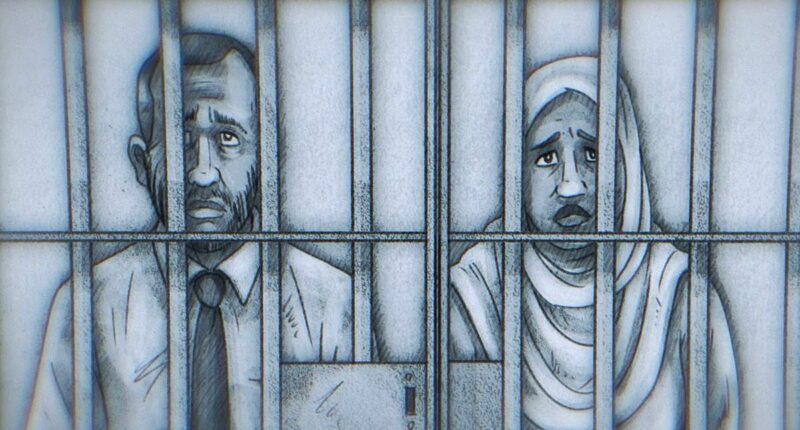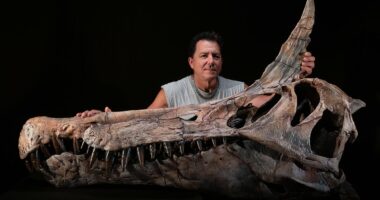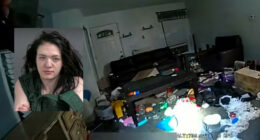Share this @internewscast.com
The only individuals ever imprisoned for female genital mutilation (FGM) in Ireland have had their convictions overturned. They are now pursuing a certificate of miscarriage of justice.
This young married couple faced imprisonment in November 2019 following a court ruling that found them guilty of performing FGM on their infant daughter.
Referred to as Halawa and Sayeed (aliases), the couple consistently asserted their innocence regarding any harm to their daughter, Ayeesha (also an alias), yet they both served time in jail.
Halawa received a sentence of four years and nine months, while Sayeed was sentenced to five and a half years.
They faced charges on two counts: performing an act of FGM and child cruelty, with their sentences to be served concurrently.
The case has been the subject of an investigative six-part podcast series by RTÉ titled “First Conviction.” The series, narrated by Oscar-nominated actress Ruth Negga from Co. Limerick, was crafted by Tim Desmond and Liam O’Brien, with reporting by Pam Fraher.
Their case sheds light on significant issues found within the translation services of the justice system – with the couple, originally from non-English speaking African regions, having lived in Ireland for nearly a decade.
It was the finding of these faults that founded a successful appeal which overturned their convictions, after the couple – who were then parents to three children under five – had spent two years in prison.

The young married couple (depicted here) were jailed in November 2019 after a court found they had committed FGM on their infant daughter
First Conviction was built on interviews of the couple for more than a year and discussions with legal teams and experts.
FGM is the partial or total removal of the external genitalia of a girl or woman for non-medical reasons.
More than 230million women and girls have experienced FGM, the World Health Organisation states.
The situation began nine years ago in a flat in south Dublin. Sayeed recalled finding Ayeesha crying and bleeding from an unknown source after falling over – prompting him to take her to Crumlin Children’s Hospital.
Sayeed told RTÉ he had pushed for Ayeesha to have an internal inspection as the bleeding persisted – after a nurse told them they could go home.
The subsequent examination led to suspicions of harm by hospital staff who did not believe Sayeed’s explanation that his daughter had fallen on to a toy and, as a result, child protection protocol was instigated.
Tusla and gardaí became involved in the case and issues surrounding translation occurred in Sayeed’s very first interview at the Garda station.
Translation expert Dr Mary Phelan told RTÉ: ‘With the first interpreter, there are a lot of problems with his French, and so he has difficulty interpreting caution; the reason why the person is being interviewed; he doesn’t know how to translate FGM; and it’s clear from the video that he has no pen or paper. He is totally reliant on his memory and he frequently omits details.’
Problems continued into Sayeed’s second interview, as the interpreter struggled to translate legal phrases and didn’t know how to translate FGM.
This goes against one’s constitutional right in Ireland to clearly understand everything that is being said to them and the process, Dr Phelan said.
After numerous interviews and statements, the couple were subsequently arrested and put on trial.
FGM carries a maximum sentence of 14 years under the Criminal Justice Female Genital Mutilation Act 2012.
Halawa and Sayeed’s convictions were the first in the State under the Act, which was written into law four years before Halawa’s injury.
Both Halawa and Sayeed pleaded not guilty at Dublin Circuit Criminal Court in November 2019 to both counts against them: carrying out the act of FGM on their daughter, and child cruelty.
The DPP never accused the couple of actually performing FGM on Ayeesha – instead it alleged they ‘aided, abetted or procured’ an act of FGM on their daughter while being present as it was performed.
This was argued despite the gardaí failing to provide any evidence of someone else being involved, therefore performing the actual act causing Ayeesha’s injury.

A six-part RTÉ podcast series, First Conviction, narrated by Oscar-nominated Co. Limerick actress Ruth Negga , and written and produced by Tim Desmond and Liam O’Brien alongside reporter Pam Fraher (pictured), has investigated the circumstances surrounding the case
The trend of negligence surrounding translation continued into the trial and the switching between three languages in court: English, French and an African language.
It was decided that the case would continue to be heard on the second day of the trial despite the absence of Halawa’s interpreter – who failed to attend due to a road traffic accident.
Evidence provided by the gardaí was being translated from English into French for Sayeed by his translator, who would then translate it into Halawa’s African language.
The day concluded after it became too difficult to translate evidence from a forensic scientist.
During the trial, medical professionals questioned the couple’s story by saying the injury did not appear to be accidental, nor was it consistent with the story of how it happened.
Paediatric surgeon Dr Sri Paran told the court Ayeesha’s injury could not have been accidental when he examined her at hospital – prompting him to refer the case to the gardaí.
According to Dr Sinead Harty – who was the lead of Crumlin Children’s Hospital for child protection – the clitoral head was missing when she examined Ayeesha; she told the court that ‘it was caused by female genital mutilation,’ which was upheld by Dr Deborah T Hodes, an FGM expert brought in by the prosecution, whose report concluded that in her opinion ‘the findings are consistent with FGM’.
It was an opinion held despite there being no sign that Ayeesha had been sedated nor held down – which are commonly attributed with the act of FGM.
This counter-argument was supported by CCTV footage showing Ayeesha jumping from chair to chair in the hospital – and the lack of medical proof of bruising or sedation.
Failings in the translation of information resumed on a critical part of the defence of the trial, concerning how the couple found Ayeesha when she injured herself.
Back-and-forth confusion persisted in court over the words ‘standing,’ ‘sitting’ and ‘over’ – which is said to have impacted nearly all of Sayeed’s evidence as he maintained that Ayeesha injured herself by falling on a toy.
Sayeed told RTÉ: ‘The jury didn’t hear what I was expressing. Maybe the interpreter struggled to translate legal phrases and didn’t know how to translate FGM.’
This goes against one’s constitutional right in Ireland to clearly understand everything that is being said to them and the process, Dr Phelan said.
After numerous interviews and statements, the couple were subsequently arrested and put on trial. FGM carries a maximum sentence of 14 years under the Criminal Justice Female Genital Mutilation Act 2012.
Halawa and Sayeed’s convictions were the first in the State under the Act, which was written into law four years before Halawa’s injury.
Both Halawa and Sayeed pleaded not guilty at Dublin Circuit Criminal Court in November 2019 to both counts against them: carrying out the act of FGM on their daughter, and child cruelty.
The DPP never accused the couple of actually performing FGM on Ayeesha – instead it alleged they ‘aided, abetted or procured’ an act of FGM on their daughter while being present as it was performed.
This was argued despite the gardaí failing to provide any evidence of someone else being involved, therefore performing the actual act causing Ayeesha’s injury.

Halawa and Sayeed (not their real names) were convicted but maintained they never harmed their daughter Ayeesha (not her real name), yet were jailed

Halawa was imprisoned for four years and nine months and Sayeed was sentenced to five-and-a-half years
The trend of negligence surrounding translation continued into the trial and the switching between three languages in court: English, French and an African language.
It was decided that the case would continue to be heard on the second day of the trial despite the absence of Halawa’s interpreter – who failed to attend due to a road traffic accident.
Evidence provided by the gardaí was being translated from English into French for Sayeed by his translator, who would then translate it into Halawa’s African language.
The day concluded after it became too difficult to translate evidence from a forensic scientist.
During the trial, medical professionals questioned the couple’s story by saying the injury did not appear to be accidental, nor was it consistent with the story of how it happened.
Paediatric surgeon Dr Sri Paran told the court Ayeesha’s injury could not have been accidental when he examined her at hospital – prompting him to refer the case to the gardaí.
According to Dr Sinead Harty – who was the lead of Crumlin Children’s Hospital for child protection – the clitoral head was missing when she examined Ayeesha; she told the court that ‘it was caused by female genital mutilation,’ which was upheld by Dr Deborah T Hodes, an FGM expert brought in by the prosecution, whose report concluded that in her opinion ‘the findings are consistent with FGM’.
It was an opinion held despite there being no sign that Ayeesha had been sedated nor held down – which are commonly attributed with the act of FGM.
This counter-argument was supported by CCTV footage showing Ayeesha jumping from chair to chair in the hospital – and the lack of medical proof of bruising or sedation.
Failings in the translation of information resumed on a critical part of the defence of the trial, concerning how the couple found Ayeesha when she injured herself.
Back-and-forth confusion persisted in court over the words ‘standing’, ‘sitting’ and ‘over’ – which is said to have impacted nearly all of Sayeed’s evidence as he maintained that Ayeesha injured herself by falling on a toy.
Sayeed told RTÉ: ‘The jury didn’t hear what I was expressing. Maybe they were thinking I’m lying, I’m escaping the question, I’m not answering it properly… I was deeply sad and did not have hope for justice.’
After around four hours of deliberation, the jury unanimously found both Sayeed and Halawa guilty of both counts. In January 2020, Judge Elma Sheahan jailed the father for five and-a-half years and the mother to four years and nine months.
During their imprisonment, the couple assembled new legal teams and began to appeal their convictions after more than 250 days in prison.
Defence solicitor James McGuill led Sayeed’s appeal.
On reading the transcripts of the trial, Mr McGuill told the programme: ‘It just looked like gibberish because the questions didn’t follow the answers and the answers didn’t follow the questions.’
This formed the first grounds of appeal while the second was based on medical evidence and medical expert opinion on the trial.
The new legal teams sought new expert medical opinion.
After a delay in the appeal process due to the Covid pandemic, the defence teams were given a rare permission to choose new evidence – as there was ‘real concern about the safety of the conviction’, Mr McGuill said.
He added: ‘The court were already with us on interpretation because they could see straight away that the standard was unacceptable.’
This argument was bolstered after Dr Phelan gave expert opinion on the court translations, highlighting crucial errors.
The second ground of appeal – on medical evidence and expert opinion – was supported by Professor Birgitta Essén, an expert on FGM.
After reading the medical reports and watching videos of Ayeesha’s injuries, Professor Essén concluded that no FGM had taken place.
This contradicted the original medical expert provided by the couple’s previous legal teams, who admitted he had no particular expertise on FGM – and ended up agreeing with the medical witnesses brought forward by prosecution.
Notably, no FGM expert had actually physically examined Ayeesha throughout the years.
In 2021, the couple successfully appealed their charges on the first ground of failings around translation – due to not having a fair trial through inaccurate translation and, therefore, being unable to properly defend themselves.
Halawa and Sayeed were released from prison and returned home to their three children.
This marked the first time in Ireland that translation issues formed the foundation of a successful Circuit Court appeal, according to RTÉ.
A retrial took place in 2023 and concluded after a jury was unable to agree on a verdict.
The charges were subsequently dropped by the DPP in 2024 as it entered a nolle prosequi – meaning prosecution will stop.
An application was then made to the Court of Appeal in January for a certificate of miscarriage of justice.
Sayeed and Halawa’s story will continue in January – when an application for their wrongful conviction will be heard.
















